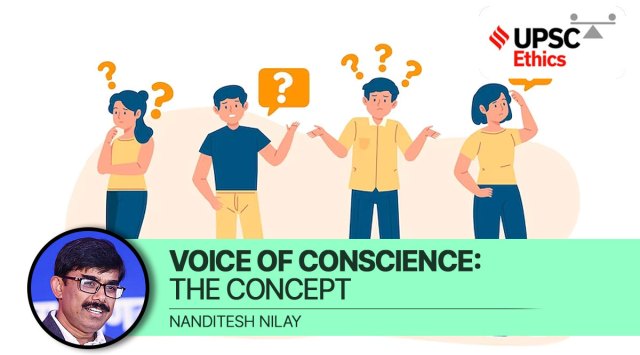UPSC Ethics Simplified | Voice of Conscience — the concept
In this materialistic world there is a lot of noise. So how to listen to our voice of conscience? Nanditesh Nilay explains the concept for UPSC CSE aspirants. Don't miss the Express Input to know how conscience played an important role in a teacher's professional life.
 "Even a bureaucrat has to confront numerous situations where other voices are overpowered by a voice of conscience", writes Nanditesh Nilay. (Image credit: Abhishek Mitra)
"Even a bureaucrat has to confront numerous situations where other voices are overpowered by a voice of conscience", writes Nanditesh Nilay. (Image credit: Abhishek Mitra) Are you often advised that before taking any important step or decision in your life, sit back and think? Have you ever heard someone listening to their inner voice before taking any action? One who listens to his or her conscience is likely to act not only wisely but also ethically. So, conscience is the buzzword. Let’s know more about it in the most lucid and applicable way.
Relevance: The topic is a part of the UPSC CSE General Studies Paper-IV Ethics Syllabus. Aspirants will find the article useful for their Essay paper too. Moreover, the essence of the article will help aspirants in their professional lives or in life in general. Don’t miss the Express Input for a real-life example and a point to ponder.
Nanditesh Nilay writes for UPSC Ethics Simplified fortnightly on Sundays. The first article is a concept while the second article is a caselet based on the concept.
What is conscience?
Do we realise the voice of conscience? I hope there would have been incidents in our lives when we reach nearer to our conscience. Even a bureaucrat has to confront numerous situations where other voices are overpowered by a voice of conscience. But that empowering voice has to confront numerous situations and a lot of times the deafness turns out to be a long shadow. Even many times when we are faced with ethical dilemmas, we fail to recognize the voice of conscience properly. Now the question is what is conscience all about?
Conscience is a kind of faculty which is unvarying, innate, and incorruptible and it is present in all human beings. In other words, conscience is the true self of human beings and a Kindle of guidance. It is a dependable source and it carries a voice. When someone feels that sermon, recommendation, or exhortation from one’s conscience, it is referred to as the voice of conscience.
What is the challenge and how to listen to the voice of conscience?
The challenge is the noise around us. The noise of confusion, ignorance, beliefs, notions, power, dogmas, upbringing, pressure, and other temptations. And in the midst of that noise, one will have to learn to heed to the voice of conscience. For listening to that voice in the middle of that noise of darkness one needs that input of human values and ethical competence. That ability to investigate that noise will prepare a mortal to listen to the voice, the voice of conscience.
So how to listen to that voice of conscience? It will take efforts to clear the noises. And for a bureaucrat who is always guided by rules and public benefit, one needs a sincere conditioning as well as practice to heed to the voice of conscience clearly. Here apart from family upbringing, we have to continuously train ourselves to seek guidance from within while making any decision. Is it possible? Why not? In a materialistic world there is a lot of noise and surprisingly we all keep a keen ear to those echoes. But an acute focus of self on the self will construct and evolve a person to reach nearer to that spirited self for listening to that voice of conscience. Remember, this paper is not about completing a curriculum but simultaneously preparing that mind and soul ethically competent. So when a person carries a spirited urge for the truth, for the righteousness in conduct one can approach one’s conscience more and more clearly.
So, what one needs to do further?
We need some time to introspect, contemplate and evaluate our behaviour, our actions and here our conscience will keep on guiding us provided we are seeking for that faculty. Great Vivekananda or Mahatma Gandhi are towering leaders who carry those soulful ears to listen to the voice of conscience in the midst of noises.
EXPRESS INPUT
Ethics Exemplified: Bihar teacher listens to ‘conscience’, returns 33-month salary to college
Santosh Singh writes in The Indian Express about Lalan Kumar (33), who taught Hindi at Nitisheswar College in Bihar’s Muzaffarpur, returned his earnings since September 2019 as no student turned up for his class for the past 33 months. Let’s know more:
An assistant professor of Nitisheswar College, in Bihar’s Muzaffarpur, has returned nearly Rs 24 lakh — his total earnings since joining the job in September 2019 — as no student turned up for a single class in these 33 months, and his “conscience did not allow” him to pocket the salary without teaching.
Lalan Kumar, 33, gave a cheque of Rs 23,82,228 to the registrar of BR Ambedkar Bihar University (BRABU) on Tuesday. The college is under the aegis of BRABU, a state university.
“My conscience does not allow me to take a salary without teaching,” Kumar told the media on Wednesday. “Even during online classes (during the pandemic), there were only a handful of students present for Hindi classes. If I take a salary without teaching for five years, it would be academic death for me.”
Founded by freedom fighter Nitisheshwar Prasad Singh in 1970, Nitisheswar College has been affiliated to BRABU since 1976. It offers undergraduate courses in Arts and Science.
While the college’s principal, Manoj Kumar, questioned Kumar’s motive in returning his salary — “it is not just absenteeism [of students] but a pressure tactic to get a transfer to postgraduate department,” he said — BRABU registrar R K Thakur lauded the move.
“What Lalan Kumar did is quite unusual and merits our immediate attention. We are discussing the matter with the vice-chancellor and would soon ask Nitisheshwar College principal to explain absenteeism,” Thakur told The Indian Express.
Lalan Kumar, who completed his Masters in Hindi from Delhi’s Jawaharlal Nehru University and PhD and MPhil from Delhi University, had also applied for transfer to the PG department in order to be “academically involved”.
Ever since he joined — this was his first job — Kumar said he never saw any environment of education in the college. “I heard my inner voice and decided to return my salary for two years and nine months to the university,” he added.
Nitisheshwar College has nearly 3,000 students, of whom approximately 1,100 undergraduate students have to study Hindi. Kumar is the only regular Hindi teacher in the college, aside from a guest teacher for the subject.
In all, the institution has 31 regular and guest teachers.
Asked why students were absent even before the pandemic, college principal Manoj Kumar did not spell out any specific reason. “Academic activity has been disturbed in the college due to frequent examinations,” he said. “A few months after Lalan Kumar joined, the world saw several waves of Covid-19. We had online classes during that period.”
(Source: Bihar teacher listens to ‘conscience’, returns 33-month salary to college by Santosh Singh)
Point to ponder: In matters of conscience the law of majority has no place ~ Mahatma Gandhi (Young India). What does it mean to you?
Just FYI:
Gandhi believed — The rule of majority does not mean that it should suppress the opinion of even an individual if it is sound. The opinion of an individual should have greater weight than the opinion of many, if that opinion is sound on merits. That is my view of real democracy. (Mahatma, Vol. VI)
(Source: http://www.mkgandhi.org)
Thought process:
Number doesn’t matter more than the ethical principles. Hence, decision making should not be based on what society supports but what your conscience based on conscience. Remember, many times society takes a decision based on the requirement and demand of the majority. Is that always the right path? Is it always ethical?
A similar quote which aspirants should know : “There comes a time when one must take a position that is neither safe, nor politic, nor popular, but he must take it because conscience tells him it is right.” ~ A Testament of Hope: The Essential Writings and Speeches)
(The writer is the author of ‘Being Good and Aaiye, Insaan Banaen’. He teaches courses on and offers training in ethics, values and behaviour. He has been the expert/consultant to UPSC, SAARC countries, Civil services Academy, National Centre for Good Governance, Central Bureau of Investigation (CBI), Competition Commission of India (CCI), etc. He has PhD in two disciplines and has been a Doctoral Fellow in Gandhian Studies from ICSSR. His second PhD is from IIT Delhi on Ethical Decision Making among Indian Bureaucrats. He writes for the UPSC Ethics Simplified (Concepts and Caselets) fortnightly.)
— Edited by Manas Srivastava
Do not miss The Caselet on Voice of Conscience by Nanditesh Nilay in UPSC Ethics Simplified on May 11.
(The UPSC Essentials Indian Express is now on Telegram- Indian Express UPSC Hub. Click here to join our YouTube channel and stay updated with the latest updates.
Note: Catch the UPSC Weekly Quiz every Saturday evening and brush up on your current affairs knowledge.)
Share your views, answers and suggestions in the comment box or at manas.srivastava@indianexpress.com
UPSC Magazine

Read UPSC Magazine
- 01
- 02
- 03
- 04
- 05































